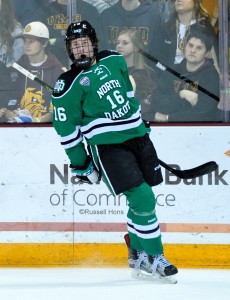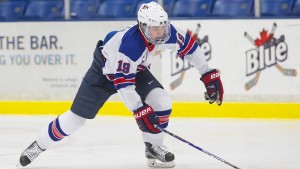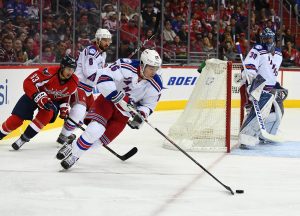While NHL teams are looking to solidify their bids for the postseason at this time of year, general managers continue their roles off the ice. The job of the front office is never done, and while the trade deadline may be passed, teams are still looking for ways to benefit their clubs this season as well as in the seasons to come. When a player chooses to play in the NCAA to focus on getting an education while developing their skillset rather than playing in the CHL, they put themselves in a unique situation around the conclusion of the NHL’s regular season. While the interest of the player may be to get an education, their ultimate goal is typically playing in the NHL. Though they’re young, some talent is just too significant to pass up during a playoff push.

Getting additional, high-end talent to help during the playoff race is huge. Even for teams that securely hold playoff spots, the opportunity to sign one of their draft picks who chose to play in the NCAA to get an additional boost for the postseason could be the difference maker between being bounced in the first round and qualifying for the Stanley Cup Finals. Still, this is rarely done, and for good reason.
General managers are very rarely thinking in the short-term, however. While they may get a boost for a current playoff run, this move also serves as the next level of development for these college standouts who essentially get thrown into the fire and are forced to play meaningful hockey right out the gate. The worry, however, also comes in the fact that signing these players to NHL contracts burns the first year of their Entry-Level Contracts depending on their age. With the desire to keep a player under team control at an all-time high due to the salary cap staying relatively stagnant in recent years, NHL teams are becoming increasingly cautious in their handling of young players.
This makes the scenario of a team like the Vancouver Canucks – who sit well out of a playoff spot – signing a college player like Brock Boeser and using him to close out the season in the NHL is interesting. In doing so, the Canucks effectively burned the first year of Boeser’s entry level deal. He will become a restricted free agent following the 2018-19 season, rather than the 2019-20 season. The alternative options would have been to sign him to an Amateur Tryout Offer (ATO), using him in the AHL, and then signing him to his NHL contract starting next season. As is always the case in negotiations, there are two sides to every negotiation – the player’s side, and the team’s side.
Accelerating the Process
For a team, the goal is to lock up any player they can who will benefit their club to the cheapest deal with the best term. For the player, however, the goal is to burn their entry-level contract and often their team-control years as quickly as possible. This is to ensure the most financial security as quickly as possible. It’s basic rational behavior – everybody wants to maximize their gain while minimizing risk.

Teams must then balance the prospect of potentially losing a player due to not signing versus getting them in the lineup sooner than later to supply an inexpensive, talented player in the lineup. Another factor is paying them earlier than they may have intended due to the players perspective. This becomes an issue when players seek to sign NHL deals right away to close out a season, even if the team doesn’t necessarily see them as essential pieces for this season. In the case of the Arizona Coyotes and the Canucks, neither team necessarily needs Clayton Keller or Brock Boeser in their lineup this season. Negotiations, however, may have taken a turn where players hold the bargaining chips.
Boeser’s signing guaranteed him free agency one year sooner regardless of his games played. For Keller, however, the situation is different as he must play in 10 games before his entry-level contract kicks in. The Coyotes didn’t have 10 games remaining on their schedule this season at the time of the signing, effectively guaranteeing his contract to slide.
Leveraging the Situation
While Keller didn’t hold the same leverage that Boeser might have, players in his situation still do have a case of their own for getting signed to contracts. Teams often like the option of developing their players before playing them in the NHL. In the case of Keller, the Coyotes likely wanted him in the lineup sooner than later. Still, for players who may not be NHL ready, or who might not want to sign with the team that drafted them, however, there is still a leverage point from which they can benefit.

There has been a precedent set by players such as Justin Schultz, Kevin Hayes and most recently, Jimmy Vesey, where players will choose to play out their collegiate careers and become unrestricted free agents – giving them the ability to talk to every team to choose the situation that will best help their career trajectory. This has given some of the players a sense of leverage in negotiations that young players don’t typically have.
Players can point to the past to find examples of players not signing contracts with teams to accelerate the time-frame in which they are offered a deal. This isn’t always the case, but it is a point of leverage that players hold.
Typically, a player who is drafted by a team seeks to sign a contract as soon as possible. The intention is to have the opportunity of making the NHL roster immediately, which is difficult for even the most talented players who often see themselves sent back to their CHL teams for the following season to continue to fine-tune their game. The teams, however, hold the leverage in that situation as they have the player under team control for a significant amount of time.
CHL and NCAA Similar, but Different Options
Many will remember the case of Jonathan Drouin – a player who had signed an NHL contract and eventually fell out of favor with the team’s coaching staff. Rather than jumping to appeal to Drouin’s request for a trade, Tampa Bay Lightning’s general manager Steve Yzerman realized that he held the leverage in the situation. In the end, Drouin rescinded his trade request and posted five goals and 14 points in 17 games in the playoffs of the same season, followed by 21 goal and 53 points in 70 games so far just one season later. With the desire to make the NHL sooner than later, players will often sign their NHL contracts as soon as possible to accelerate that process.

Players that choose to use their talents in hopes of getting an education to better themselves in the future, however, may ultimately prove to be the smarter choice for the player. This could also be why so many players have elected to go the NCAA route rather than playing in the CHL in recent years. While there are many players in the CHL who aren’t signed to NHL contracts, there are zero players in the NCAA who have signed their NHL deals. This gives them leverage.
There are examples of players signing ATOs to join teams, however. One of the top prospects not yet in the NHL, Charlie McAvoy recently signed an ATO with the Boston Bruins rather than signing with the big club and burning a year of his entry-level deal. In situations like this, players see the opportunity to acclimate to the professional level without immediately feeling the strain of the NHL season and postseason.
Calculated Decisions
While players have the opportunity to use leverage to their advantage, it’s not a consistently employed strategy. As is the case with anything, weighing risk versus reward is important. A player can use their bargaining chips and try and force the hand of their NHL team. It’s also possible that they let the team decide what’s best for their development and keep negotiations civil. While players have every right to negotiate fairly, it’s important to keep a positive appearance to the other 30 NHL clubs for potential future deals.
There are different points of view regarding this situation. In the end, the decision that is best for the player is the one they must choose. Being a team player is important, but balancing that while also looking out for the individual is something that many can relate to – athletes or otherwise.